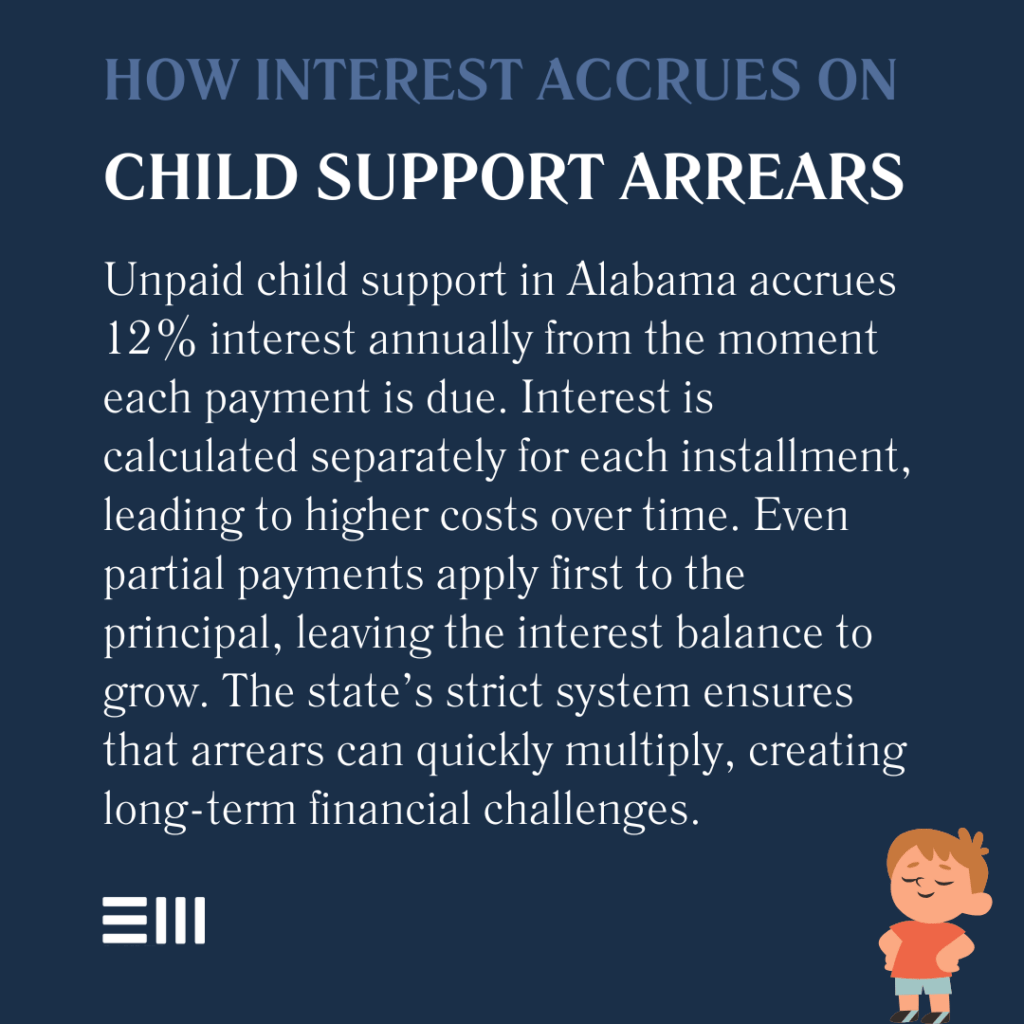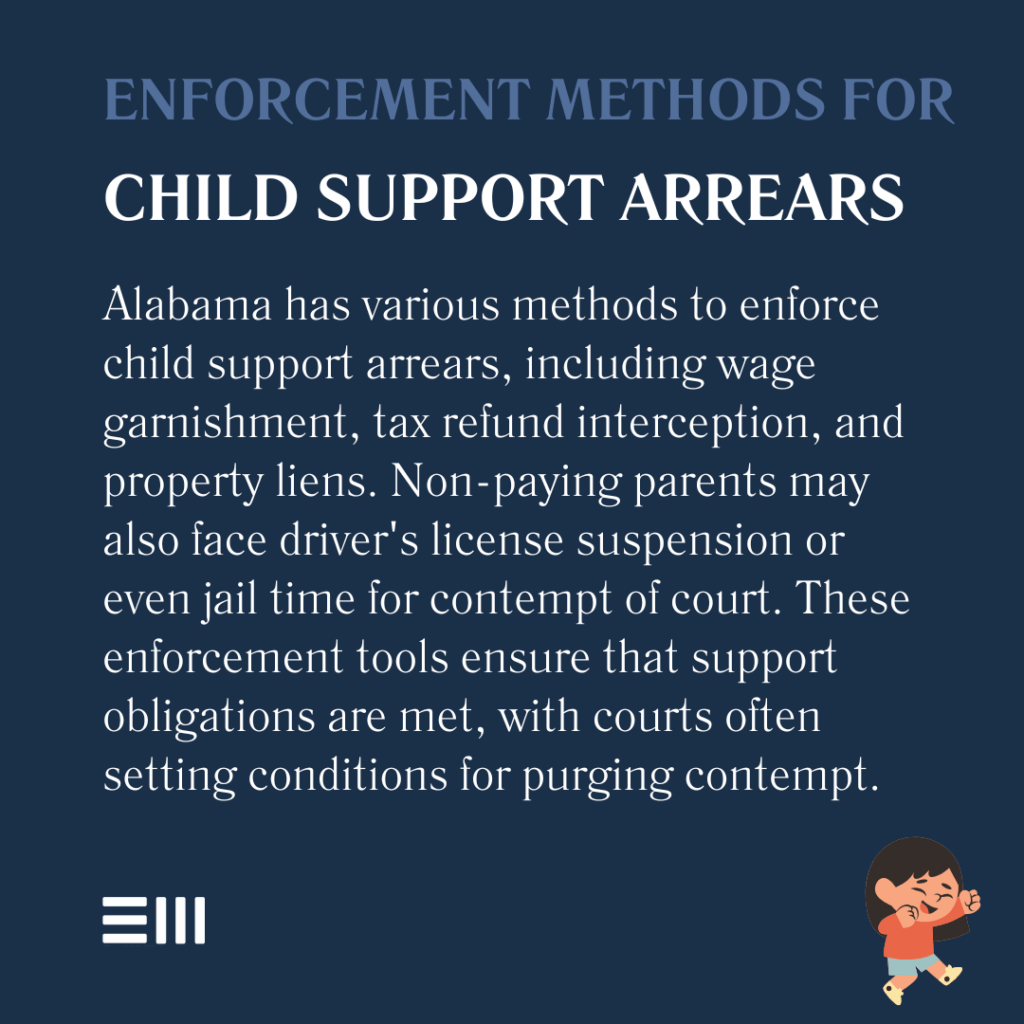
In Alabama courtrooms, the consequences of unpaid child support extend far beyond the original missed payments. When a parent falls behind, each missed payment automatically transforms into a final judgment that accrues statutory interest at 12% annually.
As highlighted in a significant 2002 Alabama Court of Civil Appeals case, even when a father was found unable to pay his current $7,982 arrearage, the court still acknowledged the additional $4,977 in statutory interest had accrued—an amount that couldn’t be waived even by judicial discretion.
This automatic interest mechanism fundamentally changes the financial equation for parents on both sides of support obligations, creating long-term consequences that many fail to anticipate until they’re facing substantial legal and financial challenges.
What Are Child Support Arrears in Alabama?
Child support arrears laws in Alabama represent unpaid child support that has accumulated over time.
In Alabama, each missed payment automatically becomes a final judgment on its due date. This legal classification carries significant consequences that extend far beyond the original amount owed.
Alabama courts treat each support payment as a separate judgment that cannot be retroactively modified. When a parent falls behind, these arrears begin accumulating interest immediately, potentially doubling the original debt over several years.
The legal framework surrounding these arrears aims to ensure financial support remains available for children while providing mechanisms for collection that can follow the owing parent for decades.
How Interest Accrues on Alabama Child Support Arrears
Alabama law mandates that unpaid child support automatically accrues interest at a rate of 12% per annum from the moment each payment becomes due. This statutory requirement cannot be waived by courts, creating a significant financial incentive for prompt payment.
When calculating interest on arrears, Alabama courts must compute interest on each individual installment from its specific due date—not on the total balance. This calculation method often results in substantially higher interest amounts than many parents anticipate.
As clarified in T.L.D. v. C.G. (2002), when partial payments are made toward child support debt, Alabama law requires these payments be applied first to principal, with any remaining amount then applied to interest—contrary to the standard debt repayment approach used for other financial obligations.
This unique payment application helps reduce the base amount but can extend the time needed to eliminate the growing interest.

Enforcement Methods for Child Support Arrears in Alabama
Alabama courts employ multiple enforcement mechanisms to collect unpaid child support. These methods range from relatively mild interventions to serious financial and legal consequences for non-paying parents.
The enforcement methods include:
- Income withholding orders that automatically deduct support from wages;
- Contempt of court proceedings that can result in jail time;
- Suspension of driver’s, professional, and recreational licenses;
- Interception of tax refunds;
- Liens against property and assets;
- Garnishment of bank accounts; and
- Reporting to credit bureaus.
In cases where contempt is found, courts typically establish specific purge conditions—actions the non-paying parent must take to avoid sanctions.
As seen in T.L.D. v. C.G., these conditions usually involve making substantial payments toward the arrearage or establishing a consistent payment plan. The dual purpose of these enforcement mechanisms is both to collect past-due support and to ensure ongoing compliance with support obligations.

Defenses to Child Support Arrears in Alabama
When facing child support enforcement proceedings, Alabama law recognizes several legitimate defenses that may protect parents from contempt findings or reduce financial obligations. Understanding these defenses can be crucial for parents experiencing genuine inability to pay.
Common legal defenses include:
- Inability to pay due to documented financial hardship;
- Involuntary unemployment or medical disability;
- Bankruptcy (though child support itself cannot be discharged);
- Significant change in circumstances since the original order; and
- Evidence of direct payments not processed through the state system.
The burden of proof shifts during contempt proceedings for arrears. As established in T.L.D. v. C.G., initially, the custodial parent must prove the existence of the child support order and non-payment.
Then, if the non-custodial parent claims inability to pay, the burden shifts back to the custodial parent to prove “beyond reasonable doubt” that the obligated parent is financially able to pay—an unusually high standard in civil proceedings.
Courts carefully distinguish between inability to pay and unwillingness to pay, with only the former serving as a valid defense.
The Impact of Voluntary Unemployment on Child Support Arrears
Alabama courts take a firm stance on voluntary unemployment or underemployment when evaluating child support obligations and arrears.
Judges have authority to impute income to parents they believe are intentionally earning less than their capacity.
When courts determine a parent is voluntarily underemployed, they may:
- Calculate child support based on potential income rather than actual earnings;
- Impute income based on previous employment, skills, and local job markets;
- Find a parent in contempt despite current unemployment;
- Order job-seeking requirements as part of purge conditions; and
- Require regular reporting of job search efforts.
The T.L.D. v. C.G. case established that when voluntary underemployment is found, it’s mandatory—not discretionary—for courts to impute income under Rule 32(B)(5), Ala. R. Jud. Admin.
This judicial finding can dramatically alter both ongoing support obligations and assessments of a parent’s ability to pay existing arrears.
Parents facing such allegations must be prepared to demonstrate legitimate reasons for employment changes or income reductions to avoid these consequences.
Frequently Asked Questions About Alabama Child Support Arrears
Alabama parents often face uncertainty when navigating the complex world of child support arrears.
These common questions address the most pressing concerns regarding payment obligations, enforcement, and legal options.
How Long Can Child Support Arrears Be Collected in Alabama?
In Alabama, child support judgments can be collected for 20 years from the date each payment was due. Each missed payment creates a separate judgment with its own collection period. This means that arrears can be pursued long after a child reaches adulthood.
Can Child Support Arrears Be Modified or Forgiven in Alabama?
While ongoing child support can be modified based on changed circumstances, Alabama law prohibits retroactive modification of past-due support. Courts cannot forgive or reduce properly established arrears. Additionally, as established in cases like Walker v. Walker referenced in T.L.D. v. C.G., interest on arrears cannot be waived by courts.
What Happens if I File Bankruptcy While Owing Child Support in Alabama?
Child support debt cannot be discharged through bankruptcy. As noted in T.L.D. v. C.G., the father had filed Chapter 13 bankruptcy and was making child support payments through the bankruptcy trustee. When his bankruptcy case was dismissed, he fell behind on payments, demonstrating that bankruptcy provides only temporary structure but not elimination of support obligations.
How Does Alabama Calculate Interest on Child Support Arrears?
Alabama calculates interest at 12% per annum on each individual missed payment from its due date, as specified under § 8-8-10, Ala. Code 1975. The T.L.D. v. C.G. case specifically notes that “to properly calculate interest on an arrearage, one would have to compute the interest due on each installment from its due date.”
Can I Be Arrested for Not Paying Child Support in Alabama?
Yes. Under Rule 70A, Ala. R. Civ. P., Alabama courts can hold non-paying parents in contempt, which can result in jail time. However, as T.L.D. v. C.G. clarifies, inability to pay is a complete defense to civil contempt proceedings, and the court must provide specific means by which the parent can purge themselves of contempt.
Taking Control of Your Alabama Child Support Situation
Navigating Alabama’s child support system requires understanding both your obligations and your rights under state law. Whether you’re owed support or struggling to meet payment requirements, professional legal guidance can make a critical difference in resolving arrears issues effectively.
Don’t Face Alabama Child Support Challenges Alone
Child support arrears can quickly escalate into serious financial and legal problems. Our experienced Alabama family law attorneys understand the nuances of state support laws and can help you develop strategies to address arrears while protecting your rights and financial future.
Whether you need assistance with enforcement, defense against contempt allegations, or negotiating manageable payment plans, we provide the skilled representation you need during this challenging time.
Contact us today for a confidential consultation to discuss your specific child support situation and explore your legal options moving forward.
Can't find what you're looking for? Search our site below.










